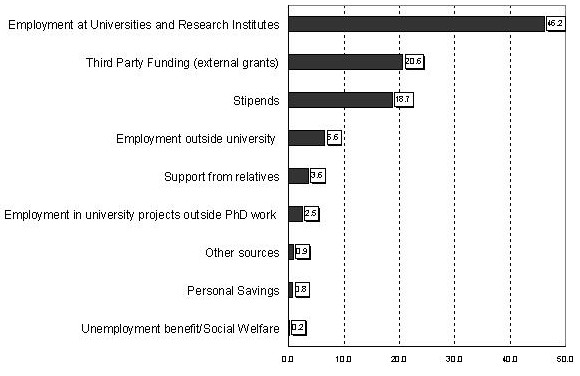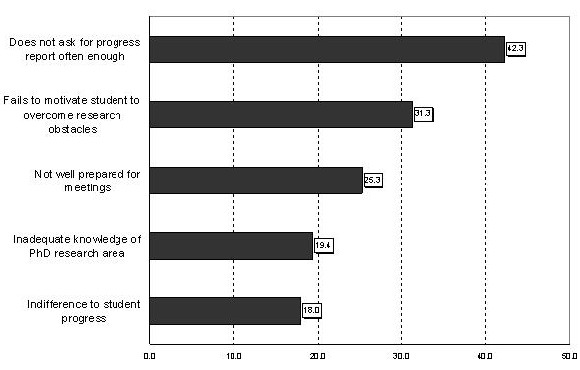Topic: GraduateGateway
ANNE FORDE
SCIENCE MAGAZINE, 21 JANUARY 2005

You're sitting at your computer wondering if you are going mad. Your supervisor seems indifferent that your last month's work has brought you into a research cul-de-sac, and your funding is just about to dry up.
One of the banes of doctoral work, compared to undergraduate studies, is the fact that at best your progress can be judged arbitrarily. How likely is it, then, that the judgement of that progress (or lack of it) is fair?
Graduate Student organisations offer advice and support on these issues. One such group is THESIS, a national network of German PhD students and postdocs, that offers both support for its members and engages in national debates on educational reform. The perception of what is acceptable in doctoral education tends to be based on personal experiences and those of immediate peers. This was the predicament that faced THESIS when they decided to work to improve the situation of PhD candidates in Germany. They soon found, explains THESIS chairperson Christopher Mues, who is also a PhD student in mathematics, that with the lack of a comprehensive, up-to-date national survey on the country's PhD students, "it was difficult to propose improvements when we didn't have real data on the current situation." So THESIS decided to undertake the survey themselves.
The THESIS online survey was launched in the summer of 2004 and ran for 3 months. Almost 10,000 people--10% of the PhD candidates in the country--completed the questionnaire, which both solicited census-type data and explored issues ranging from students' motivations in doing a PhD, to supervision experiences, funding situations, and what should be changed. Respondents came from the whole range of disciplines: 57% had a natural science, mathematics, or engineering background, with the remainder drawn from social sciences (5%), language and cultural studies (16.3%), economics (9.2%), and law (4.5 %). The results were published last month in DUZ, an independent German university magazine.
Why a PhD?
When asked for their motivations for doing a PhD, more than 85% of respondents expressed a genuine interest in their research theme. Another 14% claimed to have undertaken a PhD because they believed that no interesting jobs were available to them straight after an undergraduate degree. Given the tight job market that has existed for the past few years, Mues was pleasantly surprised with this result. "I wouldn't have predicted that a scientific interest scored so high, and that economic factors played [only] a minor role," he says.
PhD Status and Research Setting
In Germany the official status of a doctoral student covers a wide range. According to the results of the survey, 74.9% of PhD candidates--almost all of them working at research universities or institutes--have employment contracts that include social security contributions. The remaining science trainees either receive individual funding in the form of a stipend (12.8%), which normally includes no social insurance, or are classified as "external PhD candidates" (12.3%); that is, they are registered with a university but have no formal position there.
Funding Your Doctorate
Income Source % of Respondents using Source*
Fixed positions at Universities or Research Institutes 51.4
Third Party Funding (external grants) 28.2
Stipends 23.0
Employment in university projects outside PhD work 9.5
Employment outside university 15.5
Support from relatives 17.9
Personal Savings 11.8
Unemployment benefit, social welfare 2.7
Other sources 4.4
Table 1: Income sources used throughout a PhD. *More that one funding source was often applicable to respondents' situation; therefore, the total is greater that 100%.
Table 1 shows the distribution of funding sources among survey respondents. Note that many respondents received funding from more than one source; hence, the total adds up to more than 100%. Although the majority of PhD candidates surveyed have secured research funding for their project, over 25% need to work outside their PhD programme. Nearly 18% receive financial support from relatives, and 11.8% rely on their own savings. Still, more than 85% of respondents listed funding for their research project as their most important source of income; the remaining 14% are dependent on other sources (Figure 1). Interestingly, a small number--0.2%--depend on unemployment or social welfare payments as their most important source of income.
Figure 1: The most important income source during a PhD.
"Although at the superficial level the funding situation doesn't look that bad," says Mues, "there are other factors to be considered." Like the fact that many of the respondents needed more than one source of income, suggesting that funding sources are not adequate. What also concerns him is that even students with a PhD research position at a university or research institute – which most perceive as a secure situation for doctoral candidates--are vulnerable. Twenty-five percent of these PhD candidates have to interrupt their PhD work, and more than 58% of this number did so (according to the survey results) because they had too many other departmental duties--i.e., teaching and supervision--suggesting that the financial security of these positions may come at a high price.
Supervision
Almost two thirds of respondents are fully (24%), or partly (40%) satisfied with the level of supervision they are receiving, and only 4.4% are totally unsatisfied with their supervision. More than 50% say that their supervisor makes sufficient time for them and can offer specific research help. But respondents felt somewhat less positive about the quality of the supervision itself (Figure 2): 31% felt that their supervisor failed to motivate them to overcome obstacles in their work, and 42% wished their supervisor would insist on a progress report. Even more disturbing, the data show a perceived lack of knowledge on the part of the supervisor (19%) and indifference (18%) about whether the candidate is capable of coping with the demands of their research or not.
Figure 2: Most common criticisms of PhD supervisor (%).
Mues acknowledges that data on supervision seem contradictory. The reason, he thinks, is that rating supervision "is very subjective, and often PhD students have low expectations to begin with." The many comments of the respondents lead him to believe that "when supervision is in place, it tends to be good, but the problem is there is no regulation of supervision. If it is not working, major problems can arise".
Attending conferences
The THESIS survey highlighted a lack of opportunity to participate in conferences – particularly international ones – with over 65% of respondents having never attended an international conference. Candidates in more structured PhD programmes--such as a "Research Training Group" appear to be the most integrated in the wider scientific community. Research Training Group (Graduiertenkollegs) is an initiative of the German Research Foundation (DFG), where funding is given to set up a group of 15-25 doctoral students which are supervised in a centre of excellence.
Making a Wish-List
The main concern of most survey participants was the development of their career. Respondents mentioned better career opportunities for postdocs, including fewer temporary contracts and more tenure track opportunities; this was widely considered the most important issue. 75% mentioned improvement of employment conditions for PhD candidates--e.g., having social insurance in their contracts--and 65.5% said that PhD salaries should be increased. Over half the respondents would like to see better structured PhD programs, with 55% wishing to take part in taught courses and 58% desiring to be a part of a research training group.
Looking ahead
THESIS has assembled a list of recommendations based on the survey results. In their eyes, the most pressing issues are these: work for a [funded] PhD project should be undertaken within a limited time frame (ideally 3 years), and funding for that project should cover this entire period and include social insurance. They would also like to see a form of joint supervision (e.g., a professor and a more junior faculty member working together), moving away from the traditional model of one supervisor. They would also like to minimise duties unrelated to the doctorate, maximise access to supervisors with an adequate knowledge of the thesis subject, and add transferable skills as an inherent part of doctoral education.
Mues hopes the survey will add fuel to the national debate on reforming doctoral education. Already, it has gained considerable attention from education and research experts. Professor M?ller-B?ling of the Center for Higher Education Development comments, "I think that the THESIS-survey came exactly at the right moment. It gives valuable hints at a number of aspects related to the organisation and quality assurance of doctoral programmes."
Barbara Stark, a programme director at the DFG, highlights that improvements in doctoral education have been on the agenda for many years. She referred to the DFG's programme for Research Training Groups, the various graduate schools established by federal states, and the PhD-Programmes set up by universities. "These are all initiatives to improve the important period of qualification of up-and-coming researchers," she says.
Carsten Dose who works at the German Science Council also believes that these various initiatives have had an effect. There has been considerable progress over the past number of years, he feels, and he sees the next step as enlisting "more support at the university and department level. Money is an issue, but support from academic staff is more important."
All the experts agree that there should be a move away from an exclusive supervisor role. As M?ller-B?ling puts it, "a [future] structural framework has to secure academic quality and provide supervision on a less individual but more co-operative basis." Dose feels that "the 'apprenticeship' model still prevalent in German doctoral education has serious shortcomings," and would like to see graduate programmes available for all doctoral students. Stark stresses that "transparent structures" should be in place for all aspects of doctoral education
These survey results are likely to resonate for some time to come before any definitive outcome is achieved, especially within the context of the Bologna Process, which is looking at creating a single European Education Area. At a crucial time in the history of German graduate education, the survey is drawing attention to problems affecting a whole generation of researchers--problems that Germany cannot afford to ignore. Stark puts it thus: "an excellent doctoral education should not be left to chance."
(Permission to use all tables and figures was kindly provided by THESIS.)
